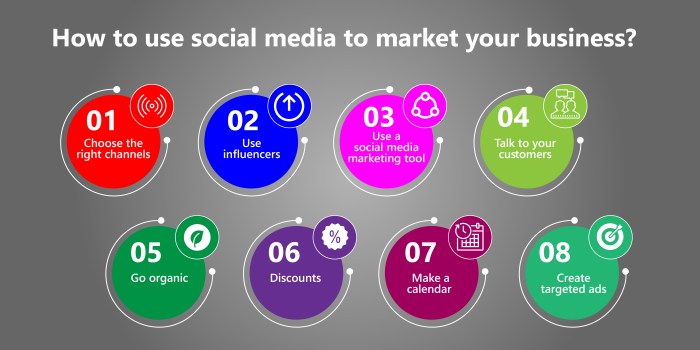White label social media advertising is a powerful strategy for businesses to expand their reach and engagement on social media platforms without the burden of creating their brand. This model allows companies to leverage a specialized platform, tailoring the branding and marketing materials to align with their specific needs and customer base. This comprehensive guide explores the intricacies of white label social media advertising, from defining the core principles to outlining marketing and sales strategies, and ultimately, building a thriving white label business.
The model offers significant advantages, including cost-effectiveness, streamlined operations, and scalability. This approach is particularly attractive for companies seeking to quickly enter the social media advertising arena without the substantial investment of developing a dedicated in-house team. It leverages the expertise and resources of a dedicated provider, freeing up internal resources for other crucial business functions. This allows businesses to focus on core competencies while benefiting from the expertise and technology of a specialized provider.
Introduction to White Label Social Media Advertising

Source: website-files.com
White label social media advertising is a business model where a company (the white label provider) offers social media advertising services to other businesses (the reseller). Essentially, the reseller brands the services as their own, leveraging the provider’s expertise and resources without having to build their advertising infrastructure. This allows resellers to focus on client acquisition and management while benefiting from the provider’s technical proficiency.
This model fosters a collaborative partnership, where the white label provider manages the advertising campaigns, analyzes data, and delivers results, while the reseller retains control over the client relationship and branding. This approach provides significant advantages in terms of scalability, cost-effectiveness, and access to specialized expertise.
Definition of White Label Social Media Advertising
White label social media advertising is a service where one company (the white label provider) allows another company (the reseller) to market and sell their social media advertising services under their own brand. The white label provider handles all the technical aspects, including campaign management, targeting, and reporting, while the reseller retains full control over the branding and client interaction.
Core Principles and Benefits
The core principles of white label social media advertising revolve around shared expertise and mutually beneficial partnerships. The white label provider benefits from increased revenue and scalability, while the reseller benefits from cost savings, access to advanced advertising technology, and reduced overhead. The key benefits are streamlined operations, focused efforts, and a cost-effective way to scale advertising services without incurring significant development costs.
Examples of White Label Use in Various Industries
White label social media advertising finds applications across numerous industries. For instance, marketing agencies can leverage this model to offer comprehensive social media packages to their clients without building their own advertising tools or teams. Small businesses lacking in-house social media expertise can also outsource their campaigns to white label providers, effectively accessing specialized knowledge and resources. E-commerce businesses can use this model to scale their social media advertising efforts while maintaining control over their brand image.
Key Differentiators from Traditional Advertising
White label social media advertising differs significantly from traditional advertising methods. While traditional advertising often relies on static campaigns and less data-driven strategies, white label advertising leverages sophisticated analytics, dynamic targeting, and real-time campaign adjustments. The core difference lies in the level of control and flexibility afforded to the reseller, enabling them to tailor campaigns precisely to individual client needs. This also translates into better performance and higher ROI.
Comparison of White Label and Traditional Social Media Advertising
| Feature | White Label | Traditional |
|---|---|---|
| Cost | Lower initial investment for resellers, potentially lower campaign costs through bulk purchasing or volume discounts. | Higher initial investment in building internal teams and infrastructure. Cost varies greatly depending on campaign complexity and resources. |
| Control | Resellers maintain complete control over branding and client interaction. | Limited control over branding and client interaction, often relying on internal resources. |
| Scalability | High scalability, leveraging the provider’s resources and infrastructure. | Scalability can be limited by internal capacity and resources. |
Key Components of a White Label Social Media Advertising Platform

Source: website-files.com
A robust white label social media advertising platform is crucial for resellers and agencies. It empowers them to offer tailored social media advertising solutions to their clients without the overhead of developing their own platform. This necessitates a comprehensive suite of features, meticulously designed to streamline the process, ensure client satisfaction, and ultimately, drive revenue.
A white label social media advertising platform must provide a user-friendly interface for both the reseller and the client. The platform needs to be scalable to accommodate increasing client demands and future growth. Critical components include comprehensive campaign management tools, robust reporting and analytics, and secure data handling. The platform should be easily customizable, allowing resellers to brand the platform according to their own identity and needs.
Campaign Management Features
Effective campaign management is fundamental to any successful advertising platform. The platform must allow resellers to create, manage, and optimize campaigns across various social media channels with ease. Key functionalities include campaign setup wizards, real-time performance tracking, and sophisticated targeting options. The system should enable A/B testing, ad copy variations, and automated bidding strategies. This streamlines the campaign process, reducing manual effort and allowing resellers to focus on client relationship management.
Reporting and Analytics
Detailed reporting and analytics are essential for understanding campaign performance and making data-driven decisions. The platform must offer clear, concise reports on key metrics like reach, engagement, conversions, and return on ad spend (ROAS). Visualizations, such as charts and graphs, are vital for presenting this data effectively. The platform should allow for customized reporting options, allowing resellers to tailor the information to meet client needs.
Technical Aspects
The technical infrastructure of a white label social media advertising platform is critical for performance and reliability. It must be highly scalable and robust, ensuring that it can handle a large volume of data and transactions. Security features, including data encryption and access controls, are paramount to protecting client data and maintaining compliance with regulations. Integration with various social media platforms is essential for seamless campaign execution. APIs and well-documented SDKs should be available to ensure compatibility and ease of use.
Hierarchical Structure
The platform should be organized into a hierarchical structure, facilitating navigation and efficient workflow. A typical structure might include:
- Platform Level: This encompasses the overall platform, encompassing features like user management, billing, and support.
- Campaign Level: This level focuses on creating, managing, and optimizing individual campaigns, including targeting, budget allocation, and ad creation.
- Ad Level: This level pertains to individual ads within a campaign, covering aspects like ad creatives, bidding strategies, and performance tracking.
Essential Features Table
| Feature | Functionality |
|---|---|
| Campaign Management | Creation, management, optimization, and tracking of campaigns across multiple social media platforms. |
| Targeting Options | Precise targeting based on demographics, interests, behaviors, and more, enabling campaign refinement. |
| Reporting & Analytics | Comprehensive reporting on key metrics, including reach, engagement, conversions, and ROAS, with customizable views. |
| Client Portal | A dedicated portal for clients to monitor campaign performance, receive reports, and communicate with the reseller. |
| Customization Options | Branding customization to align with the reseller’s identity and client needs. |
Target Audience and Market Segmentation for White Label Services

Source: hypeinsight.com
Identifying the appropriate target audience is crucial for the success of any white-label social media advertising service. A well-defined target audience allows for tailored marketing strategies and effective resource allocation, ultimately leading to higher client satisfaction and increased revenue. Understanding the specific needs and pain points of different market segments enables the creation of targeted campaigns that resonate with their interests and address their challenges.
Different Target Audiences for White Label Services
Various businesses and individuals can benefit from white-label social media advertising services. These include small businesses, solopreneurs, marketing agencies, and even large corporations seeking to supplement their existing social media strategies. The key is to understand the specific needs and motivations of each group to tailor the white-label offering to their specific requirements.
Characteristics of Target Audiences
Each target audience possesses distinct characteristics that influence their needs and expectations. Small businesses, for example, often prioritize cost-effectiveness and ease of use. Marketing agencies, on the other hand, may focus on the scalability and flexibility of the platform. Understanding these differences is critical for developing tailored service packages.
Strategies for Segmenting Markets for White Label Services
Effective market segmentation involves identifying key characteristics that differentiate customer groups. This can include factors like industry, business size, marketing goals, and budget. Analyzing existing customer data, conducting market research, and monitoring industry trends are essential steps in developing targeted segments. Developing personas for each segment allows for a deeper understanding of their needs and aspirations. Furthermore, understanding the specific social media platforms preferred by each target segment is essential to developing tailored advertising strategies.
Examples of Niche Markets
White-label social media advertising is particularly well-suited to niche markets where specialized expertise is needed. For example, services targeting artisan businesses, local restaurants, or professional service providers (like lawyers or financial advisors) can thrive by offering tailored advertising campaigns. A platform focusing on niche markets can provide specialized support, leading to higher client satisfaction and potentially higher revenue.
Table Illustrating Target Demographics for White Label Services
| Target Audience | Industry/Business Type | Size | Primary Needs |
|---|---|---|---|
| Small Businesses | Retail, restaurants, and local services | 1-10 employees | Cost-effectiveness, ease of use, and quick results |
| Marketing Agencies | Marketing, advertising, PR | 10-50 employees | Scalability, flexibility, customization, and reporting tools |
| Solopreneurs | Freelancers, consultants, and online entrepreneurs | Individual | Branding, lead generation, and affordable options |
| Large Corporations | Multinational corporations | 50+ employees | Campaign management, data analytics, and social media presence enhancement |
Marketing and Sales Strategies for White Label Solutions
Attracting clients and converting leads into loyal partners is crucial for a successful white label social media advertising business. A well-defined marketing strategy, combined with effective sales tactics, is key to driving growth and establishing a strong presence in the market. Understanding pricing models and client support processes further enhances the client experience, solidifying partnerships.
A comprehensive approach that combines targeted marketing, personalized sales strategies, transparent pricing, and exceptional client service is vital for success in the white label social media advertising sector. Building trust and establishing a strong reputation for reliability and quality service are essential elements of long-term success.
Effective Marketing Strategies for Attracting Clients
A robust marketing strategy is paramount to attracting potential clients. This involves identifying target audiences, highlighting the unique value proposition of the white label service, and utilizing a mix of online and offline channels. Content marketing, optimization, and social media engagement are crucial for establishing brand awareness and demonstrating expertise. Paid advertising campaigns can further amplify reach and target specific demographics.
Various Sales Approaches for Converting Leads into Clients
Different sales approaches can be employed to effectively convert leads into paying clients. A personalized approach that addresses individual client needs and pain points is often more successful than a generic sales pitch. Demonstrating the platform’s functionality and highlighting the potential return on investment (ROI) for clients are critical aspects of the sales process. Offering free trials or consultations can provide valuable insights into the platform and its capabilities. A dedicated account manager can also be crucial in fostering strong client relationships.
Pricing Models and Strategies for White Label Social Media Advertising Services
Establishing clear and competitive pricing models is essential for attracting clients and ensuring profitability. Transparent pricing structures, which clearly Artikel costs and associated services, build trust. Different pricing models, including subscription-based fees, per-campaign costs, or tiered packages, can be offered to cater to varying client needs and budgets. Volume discounts and bundled packages can further incentivize larger contracts.
Importance of Client Onboarding and Support for White Label Services
Client onboarding and ongoing support are vital for maintaining client satisfaction and fostering long-term partnerships. A streamlined onboarding process that articulates the platform’s features, functionalities, and user interface ensures a smooth transition for new clients. Providing comprehensive training and support materials, including tutorials, FAQs, and dedicated support channels, is crucial for successful client adoption. Regular communication, prompt issue resolution, and a proactive approach to addressing client concerns enhance the overall client experience.
Different Pricing Models for White Label Social Media Advertising Services
| Pricing Model | Description | Suitable for |
|---|---|---|
| Per-Campaign Pricing | Clients pay a fee for each advertising campaign managed. | Clients with specific, short-term advertising needs. |
| Subscription-Based Pricing | Clients pay a recurring monthly or annual fee for access to the platform and services. | Clients requiring ongoing advertising support and management. |
| Tiered Pricing Packages | Different packages with varying levels of services and features at different price points. | Clients with varying needs and budgets. |
| Volume Discounts | Discounts for clients managing a large number of campaigns or utilizing a significant amount of services. | Large businesses and agencies require substantial volume. |
Building a Successful White Label Social Media Advertising Business
Launching a successful white label social media advertising business hinges on a strong foundation of strategic planning, diligent execution, and a focus on client satisfaction. This involves understanding the intricacies of the white label model, developing strong partnerships, and cultivating a client-centric approach. Ultimately, a robust and adaptable business model will yield significant returns.
Establishing a white label social media advertising business requires a multifaceted approach that encompasses various key aspects, from developing a robust platform to building lasting client relationships. This model, while allowing for a flexible approach to the market, demands careful planning and consistent execution to yield positive results.
Essential Steps in Establishing a White Label Business
A well-defined set of steps is crucial for a white label social media advertising business. This involves not just understanding the market but also anticipating potential challenges and adapting to market trends. This process requires a proactive approach and a deep understanding of client needs.
- Thorough Market Research: Analyzing the competitive landscape, identifying target niches, and understanding market trends are crucial for developing a winning strategy. This includes researching competitors’ pricing strategies, service offerings, and customer reviews.
- Platform Development: A robust and user-friendly platform is essential for managing client accounts, campaigns, and reporting. This should include features for easy campaign setup, reporting, and client communication. Consider incorporating AI-powered tools to streamline the process.
- Strategic Partnerships: Collaborating with reputable social media management agencies, influencers, or content creators can significantly enhance your reach and credibility. Look for partners whose values align with yours and whose client base aligns with your target audience.
- Building a High-Quality Support Team: Dedicated account managers and support personnel are critical to ensuring client satisfaction. These individuals need to be adept at handling client inquiries, providing technical assistance, and proactively addressing potential issues.
- Effective Marketing and Sales Strategies: Developing a comprehensive marketing plan that highlights the benefits of your white label solution is crucial. This plan should focus on attracting potential clients and building strong relationships.
- Continuous Improvement and Adaptation: The digital landscape is constantly evolving. Regularly evaluating performance metrics, seeking client feedback, and adapting your services accordingly are vital for long-term success.
Building Strong Partnerships
Strong partnerships are vital for scaling your white label business. Collaboration with other businesses can broaden your reach and provide access to a wider range of clients.
- Identifying Complementary Businesses: Look for businesses whose services complement yours. This might include agencies, web designers, or content marketing firms.
- Developing Collaborative Agreements: Formalize agreements that articulate the terms of the partnership, including roles, responsibilities, and compensation structures.
- Promoting Synergies: Highlight the value proposition of your partnership to clients. Emphasize how your combined expertise can provide a more comprehensive solution.
Importance of Account Management and Support
Exceptional account management and support are key drivers of client retention and satisfaction. Responsive and knowledgeable personnel build trust and foster long-term relationships.
- Providing Personalized Support: Tailoring support to individual client needs is crucial for building strong relationships. This involves proactive communication and responsiveness to queries.
- Developing Dedicated Account Managers: Assigning dedicated account managers to each client fosters a sense of personal connection and strengthens the client-business relationship.
- Providing Comprehensive Training: Empower clients with comprehensive training materials and resources to maximize the use of your platform.
Attracting and Retaining Clients
Attracting and retaining clients are critical aspects of a successful white label business. This involves a proactive approach to customer acquisition and relationship management.
- Competitive Pricing Strategies: Offering competitive pricing while maintaining profitability is vital for attracting clients. Consider offering tiered pricing plans to accommodate various budgets and needs.
- Highlighting Unique Value Proposition: Emphasize the unique value proposition of your white label solution. What sets you apart from competitors?
- Building Trust and Transparency: Establish clear communication channels and provide transparent reporting on campaign performance.
Steps to Build a Successful White Label Social Media Advertising Business
| Step | Description | Key Milestones |
|---|---|---|
| 1 | Thorough Market Research | Identify target audience, competitor analysis, and market trends |
| 2 | Platform Development | User-friendly interface, robust reporting tools, API integrations |
| 3 | Strategic Partnerships | Collaborations with complementary businesses, mutual benefit agreements |
| 4 | Support Team Building | Dedicated account managers, comprehensive training, and proactive support |
| 5 | Marketing and Sales Strategy | Highlight value proposition, competitive pricing, and marketing materials |
| 6 | Continuous Improvement | Client feedback, performance analysis, and platform updates |
Legal and Ethical Considerations for White Label Advertising: White Label Social Media Advertising
White label social media advertising presents unique legal and ethical challenges. Ensuring compliance with regulations and maintaining ethical standards is crucial for building trust with clients and avoiding legal repercussions. A strong understanding of these considerations is paramount for sustainable success in this market.
Navigating the legal landscape of advertising, particularly on social media platforms, is essential for white label providers. Different jurisdictions have varying regulations regarding advertising content, endorsements, and disclosure requirements. Maintaining awareness of these differences is vital for tailoring services to specific regions and ensuring compliance.
Legal Implications of White Label Social Media Advertising
The legal implications of white label social media advertising stem from the fact that the white label provider is acting as an intermediary, creating and managing advertising campaigns on behalf of their clients. This intermediary role carries responsibilities that extend beyond the creation of the ad itself. The provider must ensure that the advertising content complies with the regulations of the platforms used and the applicable laws in each market.
Compliance with Advertising Regulations
Adherence to advertising regulations is critical for avoiding legal issues. This includes understanding and complying with regulations from various governing bodies, including the Federal Trade Commission (FTC) in the United States, and equivalent organizations globally. A crucial aspect of compliance is understanding and adhering to platform-specific policies. Each social media platform has its own set of advertising rules and guidelines, which white label providers must diligently research and understand to avoid violations. For example, misrepresenting facts, making unsubstantiated claims, or using deceptive imagery are all potential violations that can lead to penalties.
Importance of Transparency and Disclosure
Transparency and disclosure are fundamental ethical principles in advertising. White label providers must be transparent with their clients regarding the nature of their services, including the extent of their control over the advertising content. This includes clarifying who is responsible for the content’s accuracy and compliance with regulations. Clear disclosure of any potential conflicts of interest is also vital. For example, if the white label provider has an affiliate relationship with a product or service advertised, this must be disclosed to the client. Such transparency builds trust and maintains a positive reputation.
Ethical Considerations in White Label Advertising
Ethical considerations extend beyond legal compliance. Fair competition, avoiding deceptive practices, and respecting user privacy are crucial ethical aspects of white label social media advertising. Maintaining accurate data practices, protecting client data, and ensuring responsible use of advertising techniques are essential components. For example, the provider should not use techniques that exploit users’ vulnerabilities or engage in aggressive or manipulative advertising tactics. Furthermore, the white label provider must ensure that advertising campaigns do not promote harmful or misleading information.
Summary of Legal Requirements and Best Practices
| Legal Requirement | Best Practice |
|---|---|
| Compliance with platform advertising policies | Thorough review and understanding of each platform’s specific policies |
| Adherence to applicable advertising regulations (e.g., FTC guidelines) | Regular updates on legal developments and consulting with legal professionals |
| Transparency and disclosure of services | Clear contracts outlining responsibilities and disclosures of potential conflicts of interest |
| Ethical promotion and accurate information | Prioritizing ethical advertising practices and avoiding misleading or harmful content |
| Protection of user privacy and data | Implementing robust data security measures and compliance with data protection regulations |
Future Trends in White Label Social Media Advertising
The white label social media advertising landscape is dynamic and constantly evolving. Staying ahead of emerging trends is crucial for providers to maintain competitiveness and cater to the evolving needs of their reseller partners. Understanding these future directions will empower white label businesses to proactively adapt and seize opportunities.
Emerging Technologies and Their Impact, White Label Social Media Advertising
Advancements in artificial intelligence (AI) are profoundly impacting social media advertising. AI-powered tools are enabling more sophisticated targeting, personalized ad creation, and automated campaign management. These tools will significantly reduce the manual effort required for campaign setup and optimization, freeing up reseller partners to focus on strategic decision-making and client management. Moreover, machine learning algorithms can analyze vast amounts of data to predict user behavior and tailor ads in real-time. This precision targeting enhances campaign effectiveness, leading to higher conversion rates and ROI for resellers.
Innovations in White Label Platforms
The future of white label social media advertising platforms is poised for significant innovation. Expect to see greater integration with other marketing tools, like CRM systems and email marketing platforms. This seamless integration will streamline the entire marketing process for resellers, providing a comprehensive suite of tools under one roof. Further, platforms will incorporate more sophisticated analytics and reporting dashboards, allowing resellers to monitor campaign performance in real-time and make data-driven adjustments.
Future of White Label Advertising
The future of white label social media advertising will be characterized by a strong emphasis on personalization and automation. Resellers will increasingly demand solutions that empower them to deliver highly tailored experiences to their clients, and AI-driven automation will be a key component in achieving this. White label platforms will need to provide sophisticated targeting options and flexible campaign management tools to support these needs. For example, imagine a platform allowing resellers to instantly create visually appealing ads customized for each specific client, based on their brand identity and target audience. This ability will empower resellers to deliver highly personalized campaigns and enhance client satisfaction.
Future Changes in Social Media Advertising Platforms
Social media platforms themselves are continuously evolving, which directly impacts white label solutions. The shift towards short-form video content and the growing importance of influencer marketing are shaping the future of social media advertising. White label providers must anticipate these changes and adapt their platforms accordingly, providing options for resellers to leverage these emerging trends. For instance, the increasing prevalence of interactive content, such as polls and quizzes, will likely be reflected in white label solutions, giving resellers the ability to engage audiences more effectively.
Conclusive Thoughts

Source: socialmarketer.com
In conclusion, white label social media advertising presents a compelling opportunity for businesses to capitalize on the ever-growing importance of social media marketing. Understanding the key components, target audience strategies, and legal considerations is crucial for building a successful white label business. By leveraging the expertise and technology of a specialized provider, businesses can achieve significant cost savings and operational efficiencies while expanding their reach and engagement across various social media platforms. The future of white label advertising is bright, with ongoing innovations and adaptations to the evolving landscape of social media.










